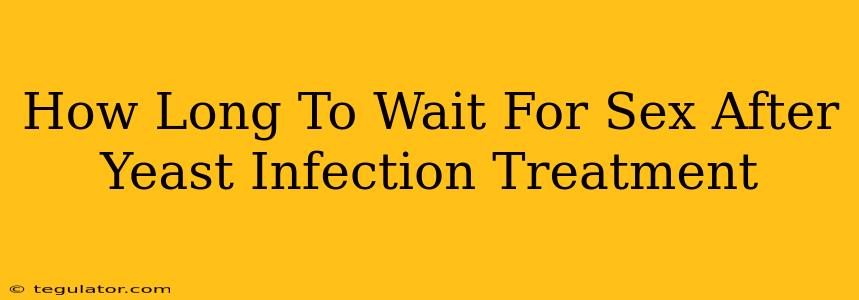A yeast infection, medically known as candidiasis, is a common vaginal infection caused by an overgrowth of the fungus Candida. While uncomfortable and inconvenient, yeast infections are generally treatable. However, resuming sexual activity after treatment requires careful consideration to ensure your complete recovery and prevent reinfection. So, how long should you wait?
Understanding Yeast Infection Treatment and Recovery
The length of time you should abstain from sex after a yeast infection depends on several factors:
- Severity of the infection: A mild infection might clear up quicker than a severe one.
- Type of treatment: Over-the-counter (OTC) treatments might require a shorter waiting period compared to prescription medications.
- Complete symptom resolution: You should not resume sexual activity until all symptoms—itching, burning, discharge—have completely disappeared.
When is it safe?
Generally, it's recommended to wait at least 24 to 48 hours after your symptoms have completely subsided before resuming sexual intercourse. This allows your vaginal flora to rebalance and minimizes the risk of reinfection or infecting your partner.
Important Note: Even after symptom resolution, if you notice any recurrence of symptoms, discontinue sexual activity and consult your doctor immediately.
Protecting Yourself and Your Partner from Reinfection
Preventing reinfection is crucial after treatment. Here are some key strategies:
Hygiene Practices:
- Cleanliness: Practice good hygiene by gently washing the genital area with mild soap and water, avoiding harsh chemicals or douching.
- Cotton Underwear: Opt for breathable cotton underwear instead of synthetic fabrics that trap moisture.
- Avoid Scented Products: Avoid using scented soaps, lotions, or feminine hygiene products in the genital area, as these can irritate the sensitive skin.
Sexual Practices:
- Barrier Methods: Consider using condoms during sexual intercourse to reduce the risk of reinfection, especially if your partner hasn't been treated for a related infection.
- Communication: Open communication with your partner is essential. They should be aware of your infection and the importance of practicing safe sex.
When to See a Doctor
While most yeast infections respond well to OTC treatments, you should consult a doctor if:
- Symptoms persist or worsen after treatment.
- You experience severe pain or discomfort.
- You have recurring yeast infections.
- You have other symptoms, such as fever or abdominal pain.
- You are pregnant.
Your doctor can provide a proper diagnosis, recommend the most appropriate treatment, and advise you on when it's safe to resume sexual activity.
The Bottom Line: Prioritize Complete Healing
Patience is key when dealing with yeast infections. Don't rush back into sexual activity before you are fully recovered. By waiting until your symptoms are completely gone and implementing preventative measures, you can significantly reduce the risk of reinfection and maintain a healthy and fulfilling sex life. Remember, your health is paramount. If you have any concerns, don't hesitate to consult your healthcare provider.

